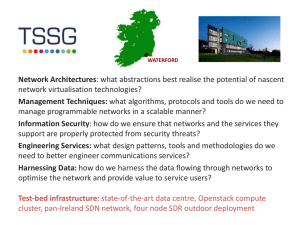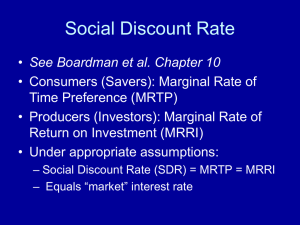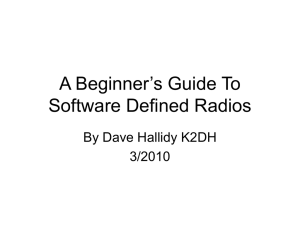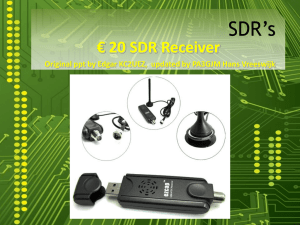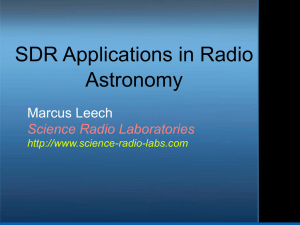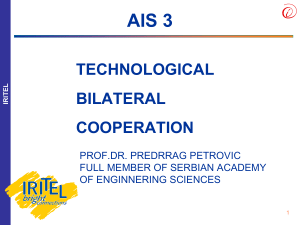SDR ne*to staro, ne*to novo pripremio tasi* Sini*a-tasa
advertisement
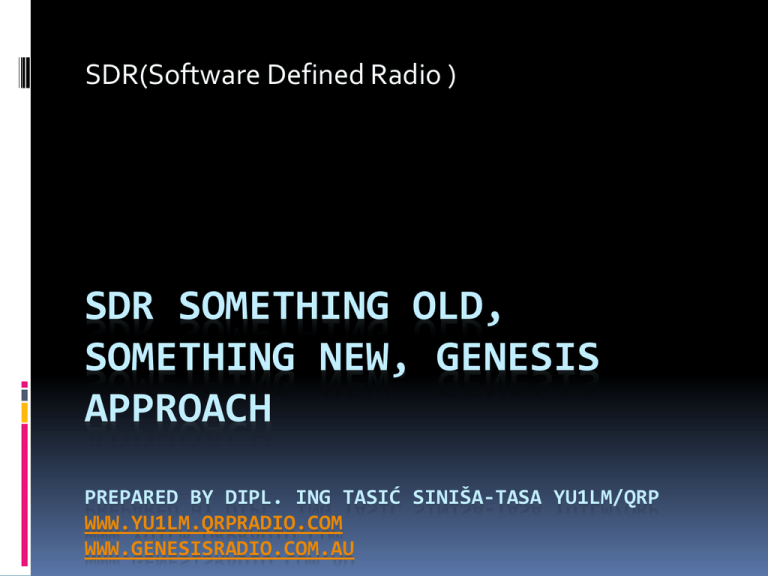
SDR(Software Defined Radio ) SDR SOMETHING OLD, SOMETHING NEW, GENESIS APPROACH PREPARED BY DIPL. ING TASIĆ SINIŠA-TASA YU1LM/QRP WWW.YU1LM.QRPRADIO.COM WWW.GENESISRADIO.COM.AU SDR(Software Defined Radio) A little SDR history and source of name SDR Basic kind of SDR equipments SDR what is old and what is new? The fundamental of Genesis’s hardware design The advantage of equipments based on the SDR technology Communications and HAM SDR radio equipments The comparison of SDR and classic transceivers What can be done with Genesis SDR equipments in this moment . YU1LM, YU1WC and YU0W results in contests The future of communication SDR technology SDR(Software Defined Radio) SDR is nothing new this technology was existing many years in the past. Mitola gave at the end of nineties name SDR(Software Defined radio) which was adopted as general concept. In recent years, significant technological progress has changed many things in our lives and the appreciation of things. Thus, the field of radio has experienced great progress installation of new modern RF components, FET transistors, integrated circuits, micro processors, and DSP (digital signal processor) for the control devices and signal processing. But in recent years we have that the appreciation of radio equipment (receivers, transmitters and transceivers) become conditional. Now radio is nothing if not connected to the PC many things became multifunctional . The SDR technology is implemented in two ways presented in Figures 1 and 2 and it is based on the use of high speed RF AD converter (LTC2208, AD6645, ADS62P49 ...) or audio AD converter independent or built-in sound card. Each implementation has its pros and cons but let us go on. SDR(Software Defined Radio) SDR receiving technology based on high speed RF AD convertorsDDC(Direct Down Convertor) The best solution is the DDC direct digital down converter. Such devices are fully digital receiver in the entrance is 12 or 14 (16) bit AD converter which can accommodate the entire range of HF to 60 MHz or more . Such devices are difficult to realize in homebrew multilayer PCB sensitive ICs with big number of pins. The AD and DA converters ICs are very expensive . The prices over 50-150USD for one IC with a few hundred pins such solutions are Perseus receivers, QS1R .... Figure 1 presents a simplified layout DDC SDR receiver (picture is from a presentation for SDR technology done by ON8DC) The best RF AD converters with 12-16 bits have the SFDR(Spurius Free Dynamic Range)dynamics of 77dB max. The Spurius Free (no false signals) with sampling rate (sampling frequency, which is based on the Nyquist criterion 2 times greater than max receiving . In case HAM 6m band it is required 120MHz sampling frequency min . The enormous amount of data it is impossible to process unless we use a special process . The circuit we are using is DD(Digital Decimator) . The decimator is not taking all the samples AD converter for example it is using every 64 ... 128 sample and we are obtaining so called Pgain (Process Gain) amplification process. So the dynamics of DCC SDR-RX for a CW signal of bandwidth B = 250Hz is equal to the formula: SDR(Software Defined Radio) SDR receiving technology based on high speed RF AD convertors -DDC(Direct Digital Convertor) Pgain=10log( RF AD sampling frequency / B) =10log(120MHz/0.00025MHz) = 56.8dB It is possible to get a few more dB if the bandwidth of SDR receiver is narrow to 50Hz or even 10Hz. The SFRD dynamic range of receiver based on high speed RF AD technology SFDR=77dB + Pgain = 133.8dB!!! SDR(Software Defined Radio) Figure 1 –SDR RX based on RF high speed AD convertors SDR(Software Defined Radio) SDR realization with AD convertors and QSD(quadrature) demodulators and modulators SDR achieved great popularity with usage solutions based on QSD-QSE-I / Q (two branches shifted by 90 degrees) demodulator or modulator shown in Figure 2 . Essentially these are DC (direct) receivers / transmitters and this is old technique where carried digitization demodulated / modulated processing audio signals what is new. The new sound cards and audio AD convertors are better and better in performances with increasing number of bits from 24 to even future 32 . So the possible dynamics of AD convertor from the threshold current card noise level to the signal which brings the system is going into clipping is in this moment from 110 to 114dB . In ideal case audio AD 24 bit convertor will give SFRD dynamic over 144dB DR= 6.02 dB x 24bita + 2,1dB=146dB But for now the dynamics of practical used 24 bit audio AD convertors are 17 to 18bit possible from 24th . SDR(Software Defined Radio) SDR realization with AD convertors and QSD(quadrature) demodulators and modulators And there is a reinforcement process we will take the same case as in the DCC SDR CW signal with B = 250Hz. Pgain = 10log (sound card sampling frequency / B) = 10log (196KHz / 0 25kHz) = 28.9dB SFDR (QSD RX) = 114 +28.9 = 143.9 dB! Of course all this is true in the ideal case, although the practical results are very close to these numbers. SDR(Software Defined Radio) Figure 2 –SDR RX based on use QSD and AF AD convertors SDR(Software Defined Radio) Figure 3- Different soundcard background noise comparison SDR(Softverski Definisani Radio) Figure 4-Soundcard background noise comparison Asus Xonar D1 and AC97 SDR(Software Defined Radio) Genesis Approach Figure 5- Connecting the SDR hardware to the PC, antenna, CW keyer, microphone and sound card SDR(Software Defined Radio) Figure 6 -Connecting the SDR hardware to the PC, antenna, CW keyer, microphone and sound card SDR(Software Defined Radio) Figure 7 - Screen shot SDR softvera Power SDR version GSDR from Genesis author Goran YT7PWR SDR(Software Definined Radio) The same hardware with different software for SDR gives completely different results, many will be very surprised when they heard what are these differences. The software is constantly upgraded it and so the same hardware we got better and better performance radios with more features related to the same radio equipment. Manufacturers of classic equipments hard to recognize the device hardware or software errors (bugs) and very rarely give way to upgrade the device becomes outdated. Soundcard from mass production with a cost that is very affordable so that excellent quality sound cards cost from 30-150 Euros while the "professional “ external sound card fantastic performances cost from 250Euro and up. The same components modern technology built into made the classic radios are more expensive and they are not very often "forced out" maximum features which is difficult to know until we buy new equipment. The drawback of the proposed concept using radio unit + sound card + PC takes a lot more knowledge to SDR transceiver system "put" to work with all of its maximum performances. A partial exception is the case for software reception (receiver) only where the matter is in most cases very simple. The SDR hardware needs to be done very well itself to achieve max performances(image and carrier related problems) notwithstanding the possibility of improving performances RX and TX with software . The SDR software made enormous calculation in DSP processing because of that it is not real time analysis . We have delay(latency) in signal processing. Faster PC will improve this situation and it will decrease delay to acceptable time even for CW the most demanding feature for SDR processing ! SDR(Software Defined Radio) S/H Demodulator Figure 8 . Simplified equivalent demodulator S/H circuit with CMOS switches use by YU1LM and FLEX radio transceivers from FLEX1500-FLEX 5000 . Figure 9. Equivalent S/H demodulator with CMOS switches design YU1LM SDR(Software Defined Radio) Figure 10 . Mechanical S/H equivalent circuit demodulatora-modulator with CMOS switches used by FLEX SDR(Software Defined Radio) Figure 11. Mechanical S/H equivalent circuit demodulator-modulator with CMOS switches used by YU1LM-GenesisRadio SDR(Software Defined Radio) Figure12. Comparison classical and SDR Transceiver IIP3 2 tone test signal difference 2kHz SDR(Software Defined Radio) Figure13. SDR Application contest K1LT 160m beam steering equipment and software SDR(Software Defined Radio) Figure14. CW Skimmer multi signal CW robot by VE3NEA SDR(Software Defied Radio) Figure 15. LF/HF/VHF/UHF monitoring and EME contact with Linard by Leif SM5BSZ SDR(Software Defined Radio) Figure 16. GSDR+WINTEST setup Alex YU0W SDR(Software Defined Radio) Figure 17. SDR application PowerSDR + N1MM setup YU1LM/QRP SDR(Software Defined Radio) Slika 18. Alex YU0W Genesis G59 + GSDR setup with 2 monitors SDR(Software Defined Radio) Figure 19. SDR transceiver CO8MTL design based on ADTRX1 YU1LM SDR(Softverski Definisani Radio) Figure 20. Multi function screen shot Log + PowerSDR+ HRD by EU1ME SDR(Software Defined Radio) Figure21. SFRD comparison SDR FLEX 5000 with K3, ICOM 7800 and ICOM 756 SDR(Softverski Definisani Radio) Figure 22. Comparison SDR FLEX 5000 with K3, ICOM 7800 and ICOM 756 SDR(Software Defined Radio) Figure 23. Comparison SDR FLEX 5000 with K3, ICOM 7800 and ICOM 756 SDR(Software Defined Radio) YU1LM /QRP made ~12000 QSOs with SDR transceivers own designs Genesis user and YU1LM/QRP results in contests 2007-2012 CQWPX-CW 2007 7MHz 7 WR / 6 EU 234 QSOs 192 PX=103 104 with SDR AVALA-01 CQWW-CW 2007 7MHz 6 WR / 5 EU 410QSOs 15 ZONE 74 DXCC=43 521 with SDR AVALA-01 IOTA 24 HOUR 2007 MIX QRP 2 WR / 2 EU 219 QSOs 55MULT=93555 CW QSOs with AVALA-05 IARU 2007 MIX QRP 10WR/ 7EU with AVALA-05 CQWWPX-CW 2008 7MHz 2 WR / 2 EU 400 QSOs 298 PX = 293 828 with SDR AVALA-01 CQWW-CW 2008 7MHz 1 WR / 1 EU 440 QSOs 18 ZONE 77 DXCC= 58 Genesis G40. CQWPX-SSB 2009 7MHz 3 WR / 2 EU 106 QSOs 94 PX = 20962 with SDR AVALA-01 = Genesis G40 CQWPX-SSB 2010 All Bands 19 EU 116 160 with SDR Genesis G59 YU DX Contest 2010 2 place in LOW/UPPer bands CQWPX-CW 2010 All Bands 18 WR / 13 EU 558 QSOs 276000 with SDR Genesis G59 CQWW-CW 2010 All Bands 9 WR / 7 EU 682 QSOs 287 300 with SDR Genesis G59 CQWPX-CW 2011 All Bands 11 WR / 9 EU 882 QSOs 589950 with SDR Genesis G59 CQWW-CW 2011 All Bands as YT0A/QRP 1047 QSO……..??? With Genesis G59 CQWPX CW 2012 14MHz 621 QSO 497484 points with G59 and G11……? Preliminary 2 WR result YU1WC Fritz CQWPX-CW 2010 2WR/2EU Genesis G40 CQWPX-CW 2011 1WR/1EU Genesis G40 YU0W –Alex WPX2012 All 962 QSOs and 1 039 388 points preliminary 11WR result SDR(Software Defined Radio) Figure24. Genesis G11 KIT 2-5 bands 10-15W SDR transceiver SDR(Software Defined Radio) Figure25. Genesis G11 2-5 bands 10-15W SDR transceiver SDR(Software Defined Radio) Figure26. Genesis G11 2-5 bands 10-15W SDR transceiver SDR(Software Defined Radio) Figure 27. Genesis G11 and G59 transceivers disign YU1LM/QRP SDR(Software Defined Radio) What is the future of SDR technology? In the very near future all devices will be produced by this SDR technology. Here is a new wave of SDR transceivers like Yaesu FT950, TS990, FLEX 6700, FTDX3000, KX3 FTDX3000, KX3 Fi Figure 28. – New Yaesu FT950 SDR transceiver SDR(Software Defined Radio) SDR(Software Defined Radio) Figure 30. Flex 6700 transceiver the best designed SDR transceiver from my point of view . SDR(Software Defined Radio) SDR(Software Defined Radio) Thank you very much for your attention! Question? The End
